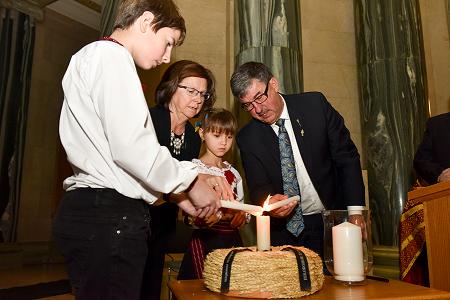Released on November 20, 2014
Today, during a commemoration service in the Legislative Building, Deputy Premier Ken Krawetz encouraged Saskatchewan citizens to remember Holodomor, a man-made famine that devastated Ukraine during the early 1930s.“We shall never forget those in Ukraine who needlessly perished during this tragedy,” Krawetz said. “I ask all citizens of our province to remember those who suffered during this time in Ukraine, a country whose people came to Saskatchewan generations ago.”
Krawetz was joined by members of the Saskatchewan Ukrainian community at the service, which included a candle lighting ceremony to mark National Holodomor Awareness Week. This year, the week occurs from November 17 to 23 with International Holodomor Memorial Day marked on Saturday, November 22.

Holodomor, which in Ukrainian means “extermination by hunger,” claimed the lives of seven to 10 million people from 1932 to 1933. It is regarded by historians as a deliberate campaign of terror perpetuated by Soviet dictator Joseph Stalin. The candle lighting ceremony is a symbolic gesture to remember those who died.
As a permanent reminder of the tragedy, an exact copy of the statue entitled “Bitter Memories of Childhood” by sculptor Petro Drozdowsky is expected to be officially dedicated on the park grounds of Wascana Centre in 2015.
The statue features a peasant girl holding a wheat sheaf. It serves as a reminder of the famine’s devastation and its impact on children. The original statue is near the entrance of the National Holodomor Museum in Kyiv, Ukraine. The statue is a project of the Ukrainian Canadian Congress – Regina Branch.
In 2008, the Legislative Assembly of Saskatchewan was the first jurisdiction in North America to recognize this genocide with the passing of The Ukrainian Famine and Genocide (Holodomor) Memorial Day Act.
-30-
For more information, contact:
Dan Palmer
Intergovernmental Affairs
Regina
Phone: 306-787-2155
